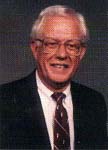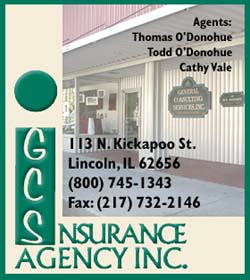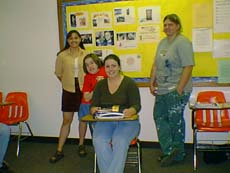|
In
1974 Wayne Shaw was asked by the administration and trustees to assume the
position of academic dean. On the faculty was a man of personal influence in
Shaw’s life, Enos Dowling. Dowling was what Shaw described as a
"spiritual father." Through his advisement, Shaw accepted the position
of his predecessor, whose vision of heritage still continues in Dr. Shaw.

[Dr. Wayne Shaw]
Shaw
said he viewed the position as a new opportunity and challenge. He believes that
this started out to be a long ministry, and he wanted to provide stability,
continuity, and the ability to unfold across a longer timeline the roles and
vision that were given to the faculty of preserving another generation of
leaders for the ministry.
Shaw
said his vision is still the same as when he started teaching. He believes that
when it comes time, people must choose what it is they want to be. They can
either be doers or multipliers. Shaw believed he could be a multiplier. He came
to Lincoln with the vision of equipping students with the ability to preach and
be multipliers.
He
strives to "find balance between the practicalities of ministry and the
need to think, to research, and live biblically and theologically."
Shaw
has not given up this vision. He continues and will continue to be a part of it
after his retirement as academic dean. Shaw is still a teacher at heart and
plans to keep on teaching homiletics at the seminary. He sees preaching as a
vital part of ministry and will not only teach it but practice it. This
Saturday, he will continue his vision as he preaches during the commencement
ceremonies, using what was also his first sermon at Lincoln.

One
of the greatest areas in which Shaw has grown as a person would be his vision.
He now sees a greater need for world ministry. He has spent time in Africa,
Asia, Europe and the United States teaching and preaching to needy people. Shaw
hopes that his faculty and staff can take up that vision and have a "global
view of their work and ministry, and that carrying out the great commission of
Christ is the prime task of the church."
|

His
experiences and time at Lincoln Christian Seminary will not be soon forgotten.
Shaw says all the experiences he has gone through have been valuable, but he
would not be where he is if there were not faculty and students. Shaw considers
every one of his faculty a personal friend. All but one of the faculty members
of Lincoln Christian Seminary have come to be there under Shaw’s deanship. He
feels that one of the strongest assets of the faculty he will leave is the sense
of cooperation they have with one another. He feels that they are free to
continue the vision by expressing their views and helping one another grow as
they do now.
Concerning
his students, Shaw said he has realized you can never teach a student anything,
that you can only help them learn. He says that over his years of experience,
this has helped him not only in teaching students but also in learning and
growing as an individual.

The
legacy Shaw hopes to leave behind is one that will grow. He would like students
to grow and have essential key values. He wants to leave behind a "climate
where faculty, students and administration can grow, a legacy of commitment to
world vision, a passion for preaching and teaching the gospel, and a concern for
developing Christian leaders who have both Christian character and
competence."
As
he leaves, he said he wants to finish well. He believes it is easy to start out
well, but only few finish well. His position will be taken over by Dr. Tom
Tanner, dean of the college, who will be assisted by a number of associate deans
in both the college and seminary. Shaw has great confidence in the leadership of
the appointed men. He said that he would like to leave this experience with a
positive transition.
Dr.
Shaw will continue to teach at the seminary and plans to read, write, mentor faculty and students at an informal
level and spend more time
with his seven grandchildren.
[Rachael
E Shelley]
|
|
It
all started before the 1998-99 school year began, when English teacher
Rita Vaught saw an ad in a professional publication for a service that
would allow high school students to publish an online paper.
The service, called Highwired.net, is offered free.
Vaught has always been interested in computers, so she decided
to try it.
Lincoln
High offers a year-long journalism class as an English elective
whenever there is enough student interest, and the interest was there
in the fall of 1998.
“The
first part of the year we spent learning how to do it.
Our first edition went up in November.
That year was a little rocky, but this year is much easier,”
Vaught said. “This
year, after a few weeks, I could say, ‘Here is your deadline,’ and
they would go to the computers and get to work.”
Lincoln
High is part of a fast-growing movement.
In 1998 there were only a couple of hundred schools that had
online newspapers. “Last
year it was something unique. Now
there are thousands,” Vaught said.

[Students
in the journalism class at Lincoln Community
High School post copies
of articles and editorials from
the Railer Review on their classroom
bulletin board. Shown here are Trenaty Gonzales, Molly Donnelly,
Becky
Mammen
and Amanda Snyder.]
She
sees a lot of positives about the Highwired.net program, which she
describes as student-friendly. It
provides a format for students to use when submitting articles and the
layout is done automatically. “We
decide what will go on the front page and what our section lead
stories will be. We have
unlimited space for articles, but there are parameters for the size of
pictures and clip art,” she explained.

The
students not only learn news writing, they learn a lot of technology.
“They have a high comfort level with technology and absorb it
quickly,” Vaught says. “They
can work at home or on any computer in the school.”
The
Railer Review, like LDN, is read by people all over the country.
Relatives of students read the Review to see what their Lincoln
grandsons or granddaughters have written.
Alumni members have found the Review and sent e-mail, and
students not in the journalism classes have occasionally submitted
articles.
Journalism
students themselves often read other school newspapers to find out
what is going on far from home. For
example, Vaught says, they learned that students in Alaska were
raising funds to continue the search for another student who had been
lost in a whiteout, a blinding snowstorm.
A
well-written story of universal interest can be submitted for use in
the Highwired.net’s national edition.
Last year an article by student Chelsie Slack, about a model
whose father died of lung cancer, appeared in the national online
paper.
Eleven
students are in the 1999-2000 journalism class, all seniors except
one. They use a basic
journalism text and have story assignments and deadlines.
They spend half their time in class, the other half in the
computer room. Articles
are assigned about classes, about the school as a whole and about the
community.
The
students write their stories and file a draft.
Then they proofread it and add graphics.
Vaught reads each article and decides if it is ready to run or
needs revision. “In two
years I’ve only had two articles that I considered unacceptable
because of content or inappropriate language,” she said.
(To
top of second column)
|

This
year’s students are a diverse group, but they work well together,
Vaught says. Mike Williams knows he wants to be a writer, probably a
sportswriter, and is going to Illinois State University to major in
mass communication. Trenaty
Gonzales, on the other hand, would like to skip the writing
assignments, but is so good with graphics and layout she helps other
teachers and staff members put out flyers and newsletters.

Joseph
Rosenthal likes sports writing but isn’t sure he would want it as a
career. Becky Mammen is interested in advertising and mass
communication. Ashley
Brinner likes photography.
Molly
Donnelly has come up against the dilemma facing every reporter.
“I want to be the person out there asking the questions, but
I don’t like deadlines.”
The
students’ many interests have resulted in a variety of articles,
including sports, makeup and prom dresses, school security,
depression, a boy who had a heart transplant, the state testing, the
baby-think-it-over program, and even the controversy over tearing down
Lincoln’s Central School.
One
memorable lesson in journalism came through a computer program on the
ethics of the profession, “Decisions, Decisions.”
The class played the role of an ad director who had to decide
how to deal with a television program high in violent content but
geared for 12- to 13-year-olds. They
had to consider the legal aspects, the possibility that their
advertisers wouldn’t stay with them and the question of rewriting
the show.
They
finally made the decision to keep the show as it was but change it
from a 7 p.m. to a 9 p.m. time slot.
When they entered the decision into the program, the computer
told them they had lost their target audience and gave them the
consequences.

“We
got fired,” Amanda Snyder said.
Although
the Railer Review is running smoothly this year, getting between 150
and 200 hits a day, Vaught has plans to widen its coverage.
“We can never know everything that goes on in this school. What we need to do now is encourage departments and
clubs to submit articles to us or just give us information and let us
write it up.”
The
Railer Review can be reached at www.highwired.net/LincolnComm/railer
or from the Lincoln High home page, www2.ccaonline.com/LCHS/.
|

